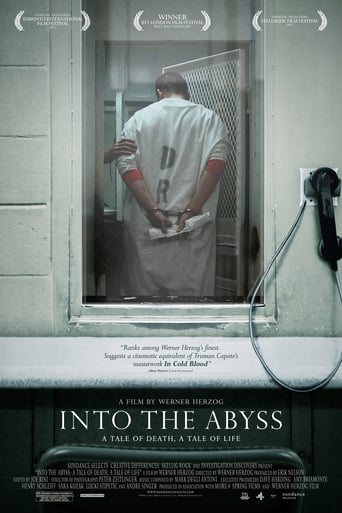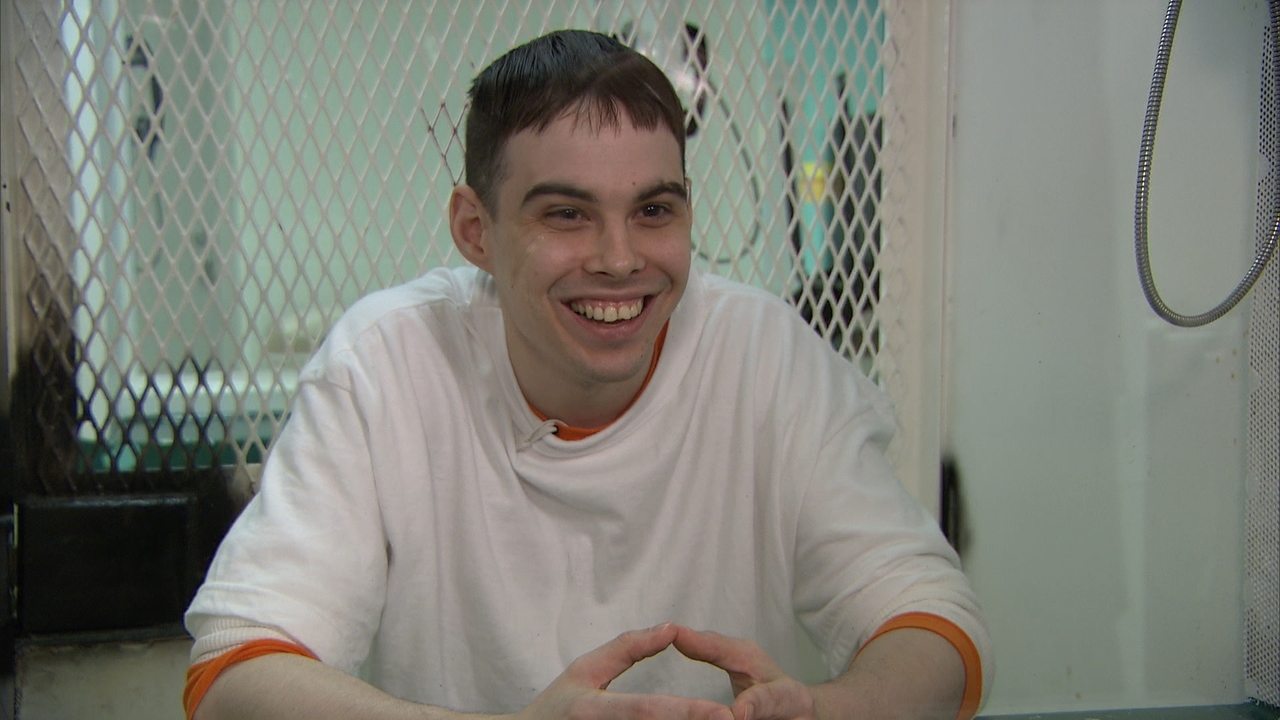tomgillespie2002
In 2001, teenagers Michael Perry and Jason Burkett were arrested and charged with a triple-homicide shortly after an intense shootout with the police. They were convicted of murdering 50-year old nurse Sandra Stotler, her sixteen year old son Adam, and his friend Jeremy Richardson. They shot and killed Sandra with a shotgun in her garage so they could steal her valuable red Camaro, and later murdered the two teenagers to obtain the keys to the gate of their middle-class community estate. As a result, Perry was sentenced to die by lethal injection, and Burkett was given a life sentence.Just how one culprit can be slated to die while the other gets to spend their life behind bars for the same crime is just one of the many questions raised in Werner Herzog's objective documentary on capital punishment. We meet Perry early on, child-like and God- fearing, just 8 days before he is due to die. During this meeting, Herzog reveals his own feelings about the death penalty (he's strictly against it) and even tells the inmate that he doesn't like him very much, but that he also respects everyone's humanity and point of view. The film is not a condemnation of Death Row, but a meditation, and Herzog simply sits back and allows the story to tell itself through interviews from all sides and sporadic narration.Although it does cover the crime itself in detail, Into the Abyss is not a re-investigation, but tells the story of the horrifying events back in 2001 juxtaposed with interviews from 2010 to allow us to make up our own mind and absorb the devastating affects such an act of brutality can cause. The most heart-breaking moment comes from the interview with Burkett's father, a prisoner himself, as he comes to terms with his own role in his son's fate. We learn of the events that attributed to his boy's character and eventual destiny, and wonder if society failed him. We then see how the crime left Sandra Stotler's daughter completely alone in life, and wonder why such a monster like Burkett should be allowed to live. You may find yourself discussing the topic in depth afterwards, but on hearing Perry's final words to the victim's families before he was given a lethal dose, I could not bring myself to believe that watching him die would ever bring them inner peace.
David Baron (neuFleisch)
This documentary feels lost between a spiritual exploration of the consequences of death and an investigation of the events of a violent crime but fails in both aspects.I really felt that the film didn't have a true focus and wandered into a plea against the death penalty but you could feel that the filmmaker doesn't understand the American mindset and questioned some of the protagonists with a certain layer of intellectual arrogance.Herzog didn't seem to emerge himself into the culture of the south, his cold shots of the poor rural areas only seemed to be integrated to showcase the "lower class" status of his protagonists instead of giving a true sense of the culture.So for a European filmmaker with a completely different cultural background, the subject matter of the death penalty must seem to a certain extend absurd & uncivilized but in the "wild west" inheritance of the American experience, executing a man for justice is embedded for centuries into the mindset of the United States.Even if his questions seemed to want to probe the emotional state of his protagonists, he didn't seem to really want to understand the "why" the death penalty is considered an acceptable form of justice in the States.And for that, I believe that this documentary feels judgemental instead of actually a 'document' of an event or of a complex cultural subject matter.
Cosmoeticadotcom
This film lacks even the Herzogian touches that a flawed film like Cave Of Forgotten Dreams retains, if even poorly. On a side note, a quick Googling of the case shows that many of the claims made by people in the film- apart and aside from the two killers, is simply not true. Now, this may be Herzogian, if he actually knew the truths and allowed lies to be filmed, but, given the tenor of the film, and Herzog's anti-death penalty stance, it seems more likely to just be poor fact-checking.Herzog narrates the film, but the cinematography and music, by Peter Zeitlinger and Mark Degli Antoni, are not up to snuff. Again, very pedestrian, and one sense that Herzog almost feels as if he needs to get a film done, no matter what, including the quality. In the end, Perry fries, and Burkett survives, but the most important point comes from the daughter and sister of two of the victims, who describes the deep sense of peace and satisfaction she got from seeing the vile Perry bite the bullet, and her disappointment that Burkett and his then girlfriend (not seen in the film but at the scene of the crime) did not also get justice meted to them. It is to Herzog's credit as a man and an artist that he allows this sentiment to get out, despite his disagreement with it. Nonetheless, the whole film seems a pointless exercise, and Herzog accords it a similar energy.
celr
Herzog is a competent filmmaker and this documentary has its moments but it's way too long. Supposedly a meditation on the death penalty it meanders, showing long tedious interviews with friends and relatives of both victims and perpetrators. There are also just too many long segments of static graphics combined with spooky music. Guess those are supposed to encourage the audience to meditate on the issues concerning life and death. In any case, the appeal here is almost wholly emotional. Herzog is against the death penalty and he pulls out all stops to show the apparent boyish innocence of the killers and recount the miserable childhoods they suffered. There's a long sequence where one killer's father goes on and on about what a failure he was as a parent. The father is also serving a life sentence for murder. The implication is that of course those sweet boys were turned into killers by the bad influence of their environment and just happened to have made a mistake, as boys will.The backstory is entirely different and for that reason the movie, while showing interesting crime scene video, fails to examine very carefully the case against the two. The investigation and capture of the suspects comes out in fragments, there is no coherent narrative here. What was, exactly, the case against them? This film is long on emotion and short on details. These killers were not innocent boys who got caught up in some prank that went wrong. They went to a house to kill and rob and had no compunction about killing again to try to cover up their crime. They were, as the details of the crime make clear, vicious, murdering psychopaths. Compassion might dictate that they should be kept alive but at what cost? This movie doesn't actually address the details in any comprehensive way. When you realize what those young men did there's a natural tendency to want to see them got rid of, permanently. But whereas revenge is considered unworthy of civilized people, we are left with the practical problem of what to do with criminals who are very unlikely to be rehabilitated and must live the rest of their long lives at taxpayer expense. It is a copout for this film to dodge these issues. Whereas we learn more of the death house procedures than we ever wanted to know there is little discussion about issues of crime and punishment. The film allows the viewer to come to his own conclusions, which is good, but provides a lot more emotion than discussion on the subject of the death penalty. Herzog can present compelling interviews with plenty of emotion but he has difficulty with a coherent narrative.


 AD
AD


